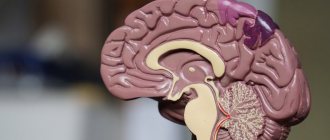Symptoms
In addition to feeling great with a feeling of comfort and carelessness, euphoria is manifested by a specific facial expression: a meaningless smile, an unfocused gaze, relaxed facial expressions. Contact with such a person can be unproductive: answers after a pause, undeveloped, not always to the point. If you ask to perform any mathematical operation, it will be performed with an error or will take a long time. A person in a state of euphoria is characterized by easy laughter and disinhibition (sexual, food) with a lack of a sense of distance and adherence to etiquette.
Euphoria and depression
A depressive reaction, being the main cause, leads a person to seek help from a therapist and is the main complaint. The depressive reaction itself is part of a cycle, drawing the curve either down or up. In many cases, the depressive reaction is preceded by euphoria, and its collapse plunges the individual into depression. If we want to understand the depressive reaction, then we must understand the phenomenon of euphoria.
The signs of euphoria are easily recognizable. An individual in a euphoric state is hyperactive, speaks quickly, and is full of various ideas. Personal self-esteem is conspicuous, and the development of this condition leads to the development of mania.
Euphoria is only a lesser degree of depressive reaction. The ego of an individual who is in euphoria is so overexcited, as if it is taking part in a miraculous, unusual event that will fulfill secret dreams. This reaction is comparable to the reaction of a child who has been separated from his mother and now awaits her return with incredible excitement. For a baby, the return of his mother and her love is his most cherished desire. Mother's love embodies the fulfillment of all the needs of the child. The return of the mother gives a motivational energy surge that ends in euphoria.
Often, a person in a euphoric state is unable to realize the dynamics of his reaction, and also unconsciously perceives people as motherly figures who should care for, love and even feed him. People will initially be interested in him, but as it grows, his condition will begin to irritate people, and they will recoil from him.
There is no guarantee that people will satisfy his unconscious hopes, so over time the person will feel rejected. Self-confidence and self-esteem that accompany euphoria dissolve, and depression sets in, and with it the collapse of illusions.
The energy charge that overstimulates the peripheral structures of the body recedes, and the omnipotent ego turns into powerless. The lack of volitional efforts of an individual oppressed by depression leads to the fact that the person is unable to mobilize himself.
People suffering from depressive conditions have not satisfied the following needs: support, experience of physical contact, attention and approval, love and care. Unmet needs are reflected in a person’s inability to be alone, talkativeness, fear of separation, bragging, and dependent behavior (addiction). This means that a person who did not receive unconditional love in childhood will be constantly subject to cyclical mood swings: euphoria will be replaced by depression. Psychologists warn patients that euphoria carries with it the danger of approaching depression.
Psychiatrists attribute euphoria to a painful increase in emotional background, as well as a decrease in critical perception of reality. It can occur with increased motor and facial activity or, conversely, with deep retardation. It all depends on the reason that causes it.
Euphoria in case of morphine poisoning proceeds stunnedly, and in manic-depressive psychosis it proceeds violently. Such a warning to people always helps, because it brings a certain amount of reality into the patients’ thinking, softening and inhibiting sudden mood swings, and with the onset of depression it is no longer so destructive.
In a euphoric state, a person always thinks that everything will be fine, but good will not happen if hidden problems are not eliminated.
A person, falling from the heights of this state into depression, feels that all his illusions are crumbling, and there is no way out of depression. A healthy person does not experience sudden changes in mood from euphoria to depression. He is able to experience excitement due to any event, as well as prospects that will give a powerful energy flow. A person in this state will feel joy, pleasure, but will not feel euphoria. If the event, as well as the prospect, disappointed him, then he will be sad, but at the same time will not fall into the clutches of depression. A healthy person does not lose the ability to adapt to a new situation.
In psychiatry
For psychiatrists, euphoria is a symptom that is a signal of trouble in the brain and an indicator of altered consciousness, equivalent to a state of stupor. Characteristic is not only a slowdown and simplification of thinking, but a decrease in receptivity and sensitivity (for example, pain). Euphoria is one of the symptoms characteristic of dementia. One of the types of psychoorganic syndrome or encephalopathy (organic brain damage) is called euphoric. In addition to dementia and psychoorganic syndrome, euphoria can be a symptom of the following psychiatric diseases: psychosis, mania, epilepsy, personality disorders, mental retardation, etc.
Competent treatment of euphoria
In the presence of euphoric intoxication, after a period of cloudless joy and excellent well-being, a turn of inactivity and passivity of behavior certainly begins. Just then, the one who was gushing with positive emotions unpleasantly impresses those around him with the sudden appearance of aggressiveness, adjacent to a bad mood. Doctors at the Korsakov Center, who know exactly how to act in such incidents, will help you get rid of such cloudiness after a bright euphoric outbreak.
We also recommend reading the article about the cure for panic attacks.
In narcology
Euphoria is the main sign of intoxication or intoxication. In such cases, euphoria consists of a whole series of “sweet” experiences and sensations: a feeling of pleasant bodily well-being (in the form of warmth, air waves throughout the body), mental pleasure and the absence of any tension, it seems that everything around has become clear. If the euphoric state is caused by taking a drug or alcohol, then it is accompanied by neurological changes: coordination disorders and decreased reflexes.
Conditions similar to euphoria: mania, hypomanic state.
What is EUPHORIA - meaning, definition in simple words.
In simple words, euphoria is a certain state of a person in which he feels absolutely happy, cheerful, and joyful. People can experience these sensations when receiving good news, when falling in love, during a trance state during religious practice, and similar situations. However, although these euphoric sensations are familiar to almost every person, there are cases when they can be signs of serious illness if not caused by the use of various drugs. But more on that below.
Causes
The causes and mechanisms for the development of euphoria lie in inhibition of the cerebral cortex and disinhibition (overexcitation) of subcortical structures. This can be caused by both diseases and non-painful conditions:
- Resolving a conflict or significant problem, achieving an important and useful result.
- Love.
- Influence of art: music, literature, images, etc.
- Alcohol intoxication, drug intoxication.
- Infections and poisoning.
- Organic mental disorders, mental retardation.
- Psychoses, schizophrenia spectrum disorders.
- Personality disorders.
Atrophy of the anterior parts of the cerebral cortex (for example, in Pick's disease) leads to chronic euphoria against a background of disinhibition and dementia. An increase in endorphin levels in the blood also causes euphoria.
Forms
If a feeling of euphoria occurs against the background of a mental disorder, it is often a symptom of organic damage to brain tissue, which may be caused by a violation of cerebral blood flow that occurs in an acute form (stroke, cerebral infarction), neurodegenerative diseases (Parkinson's and Alzheimer's diseases) with obligatory signs of the development of dementia.
A feeling of euphoria is present in the clinical picture of mental retardation of any severity. In narcology, such sensations are the object of desire for drug addicts. To experience a state of euphoria, drug addicts take narcotic substances; this activates the mechanisms of intense production of the hormone dopamine, which is responsible for the feeling of pleasure, which in turn leads to nervous and physical exhaustion.
Addictions based on excessive production and accumulation of dopamine include shopping, computer games and gambling. Alcoholic drinks can provoke a euphoric state. Drinking alcohol is associated with the emergence of a feeling of freedom, liberation, and happiness against the background of inhibition of intellectual activity. Opium use is accompanied by a feeling of euphoria without a decrease in intellectual abilities.
Statistics show that there are 250 million people in the world who are drug addicts. In the pursuit of unusual, bright, expressive impressions, a person forgets about the instinct to preserve health and life. The desire to experience euphoria contributed to the discovery of drugs and continues to turn some people into inadequate, weak-willed wasters of life.
The positive aspect of euphoria is increased adaptability, long-term motivation and the ability to withstand life's challenges. The desire to re-experience the euphoria of victory motivates athletes to make maximum efforts in sports competitions. Healthy forms of euphoria include love, music, and those associated with the contemplation of works of art.
For example, when listening to a favorite piece of music, some people fall into a state similar to trance or ecstasy. The euphoric state is short-term in nature, which is associated with high energy costs. When energy reserves are depleted, a post-euphoric phase begins, which is manifested by apathy, lethargy, and a feeling of fatigue.
Narcotic
Euphoria underlies the formation of drug and alcohol addiction. A euphoric state is a subjective positive effect from exposure to narcotic and toxic substances. The use of narcotic substances is accompanied by emotional upsurge, complacent, elevated mood and other manifestations:
- Perception disorder (visual, auditory, tactile).
- Darkness, change in level of consciousness.
- Thinking disorder.
A distinctive feature of drug euphoria is a feeling of depression, aggression, and internal dissatisfaction in a state of withdrawal (after stopping the drug). To re-experience the feeling of immense happiness, the addict needs a new dose of the drug.
The danger of drug euphoria lies in the steady regression of pleasant sensations. Over time, even with increasing doses, the addict ceases to experience the pleasant sensations for which he uses drugs. At this stage, a dose of a narcotic substance helps to get rid of the manifestations of withdrawal syndrome, restore vital activity and ability to work.
Love
The euphoria of love is a feeling as if wings have appeared. In a state of love, people experience affective, positive emotions, such as a feeling of spirituality, free floating, lightness and inspiration. Love euphoria is explained by physiological processes, chemical transformations that occur in the body during this period. The hormones testosterone and estrogen are responsible for the emergence of sexual desire.
Neurotransmitters - serotonin, dopamine, norepinephrine - are involved in the development of euphoric manifestations. The concentration of these neurotransmitters increases significantly during the period of love. It is serotonin that is called the “hormone of happiness.” Its deficiency in the body leads to depression. Dopamine is a substance that causes a feeling of bliss in smokers and cocaine addicts.
Expressions such as “butterflies in the stomach” and “looking at life through rose-colored glasses” are associated with a feeling of love euphoria. A euphoric state based on a feeling of love is a positive affect, which explains the feeling of boundless happiness in moments of life that are assessed by the individual as successes and personal achievements. When a person is mutually in love, he has realized his dream of family well-being and getting rid of loneliness.
How to achieve euphoria?
When the question arises: what is euphoria, many immediately remember unnatural states caused by the use of psychotropic substances and pharmaceuticals (drugs, pills, alcohol). They provide a surge of strength, change the perception of the world, and dramatically lift your spirits. But such methods have a detrimental effect on health. How to create euphoria using the “right ways” in everyday life?
- Sports activities. Athletes often develop vivid states against the backdrop of active physical activity.
- Meditation, for example, yoga.
- Listening to special music.
- Hobbies (drawing, poetry, etc.).
- Selfless help to others.
- Healthy and tasty food.
Enjoying life without using artificial simulators is the right choice. Unfortunately, none of the listed methods can guarantee a state of emotional uplift. The production of happiness hormones can be stimulated, for example, by tasty and healthy food (fruits, cereals, chocolate, cereals, etc.), but such a strong emotion as euphoria requires a lot of tension and internal strength.
Why is euphoria dangerous?
Euphoria can greatly harm a person. An enthusiastic state observed over a long period of time impairs the functioning of self-control mechanisms. This leads to unbalanced behavior, uncontrollability, and hysteria. This behavior can be harmful to both the patient and people around him.
Frequent manifestations of causeless euphoria lead to hysteria
Other effects of euphoria include:
- dissociation of mental activity;
- social maladjustment;
- loss of sense of reality;
- toxic dementia.
The narcotic type of euphoria is often accompanied by euphoric pain: severe physical or psychological discomfort, which the patient talks about with pleasure and joy. This is a dangerous condition that can cause serious injury.
Important! In some cases, euphoria can be fatal.











